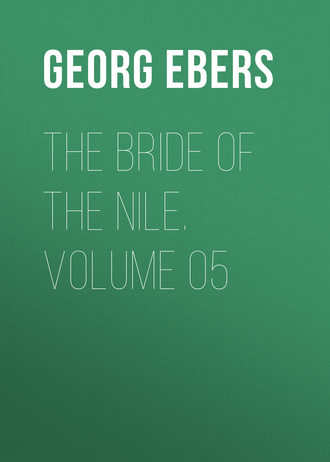
Georg Ebers
The Bride of the Nile. Volume 05
CHAPTER XX
In the neat rooms which Rufinus' wife had made ready for her sick guests perfect peace reigned, and it was noon. A soft twilight fell through the thick green curtains which mitigated the sunshine, and the nurses had lately cleared away after the morning meal. Paula was moistening the bandage on the Masdakite's head, and Pulcheria was busy in the adjoining room with Mandane, who obeyed the physician's instructions with intelligent submission and showed no signs of insanity.
Paula was still spellbound by her past dream. She was possessed by such unrest that, quite against her wont, she could not long remain quiet, and when Pulcheria came to her to tell her this or that, she listened with so little attention and sympathy that the humble-minded girl, fearing to disturb her, withdrew to her patient's bed-side and waited quietly till her new divinity called her.
In fact, it was not without reason that Paula gave herself up to a certain anxiety; for, if she was not mistaken, Orion must necessarily present himself to hand over to her the remainder of her fortune; and though even yesterday, on her way from the cemetery, she had said to herself that she must and would refuse to meet him, the excitement produced by Katharina's story and her subsequent dream had confirmed her in her determination.
Perpetua awaited Orion's visit on the ground-floor, charged to announce him to Rufinus and not to her mistress. The old man had willingly undertaken to receive the money as her representative; for Philippus had not concealed from her that he had acquainted him with the circumstances under which Paula had quitted the governor's house, describing Orion as a man whom she had good reason for desiring to avoid.
By about two hours after noon Paula's restlessness had increased so much that now and then she wandered out of the sick-room, which looked over the garden, to watch the Nile-quay from the window of the anteroom; for he might arrive by either way. She never thought of the security of her property; but the question arose in her mind as to whether it were not actually a breach of duty to avoid the agitation it would cost her to meet her cousin face to face. On this point no one could advise her, not even Perpetua; her own mother could hardly have understood all her feelings on such an occasion. She scarcely knew herself indeed; for hitherto she had never failed, even in the most difficult cases, to know at once and without long reflection, what to do and to leave undone, what under special circumstances was right or wrong. But now she felt herself a yielding reed, a leaf tossed hither and thither; and every time she set her teeth and clenched her hands, determined to think calmly and to reason out the "for" and "against," her mind wandered away again, while the memory of her dream, of Orion as he stood by his father's grave—of Katharina's tale of "the other," and the fearful punishment which he had to suffer, nay indeed, certainly had suffered—came and went in her mind like the flocks of birds over the Nile, whose dipping and soaring had often passed like a fluttering veil between her eye and some object on the further shore.
It was three hours past noon, and she had returned to the sick-room, when she thought that she heard hoofs in the garden and hurried to the window once more. Her heart had not beat more wildly when the dog had flown at her and Hiram that fateful night, than it did now as she hearkened to the approach of a horseman, still hidden from her gaze by the shrubs. It must be Orion—but why did he not dismount? No, it could not be he; his tall figure would have overtopped the shrubbery which was of low growth.
She did not know her host's friends; it was one of them very likely. Now the horse had turned the corner; now it was coming up the path from the front gate; now Rufinus had gone forth to meet the visitor—and it was not Orion, but his secretary, a much smaller man, who slipped off a mule that she at once recognized, threw the reins to a lad, handed something to the old man, and then dropped on to a bench to yawn and stretch his legs.
Then she saw Rufinus come towards the house. Had Orion charged this messenger to bring her her possessions? She thought this somewhat insulting, and her blood boiled with wrath. But there could be no question here of a surrender of property; for what her host was holding in his hand was nothing heavy, but a quite small object; probably, nay, certainly a roll of papyrus. He was coming up the narrow stairs, so she ran out to meet him, blushing as though she were doing something wrong. The old man observed this and said, as he handed her the scroll:
"You need not be frightened, daughter of a hero. The young lord is not here himself, he prefers, it would seem, to treat with you by letter; and it is best so for both parties."
Paula nodded agreement; she took the roll, and then, while she tore the silken tie from the seal, she turned her back on the old man; for she felt that the blood had faded from her face, and her hands were trembling.
"The messenger awaits an answer," remarked Rufinus, before she began to read it. "I shall be below and at your service." He left; Paula returned to the sick-room, and leaning against the frame of the casement, read as follows, with eager agitation:
"Orion, the son of George the Mukaukas who sleeps in the Lord, to his cousin the daughter of the noble Thomas of Damascus, greeting.
"I have destroyed several letters that I had written to you before this one." Paula shrugged her shoulders incredulously. "I hope I may succeed better this time in saying what I feel to be indispensable for your welfare and my own. I have both to crave a favor and offer counsel."
"Counsel! he!" thought the girl with a scornful curl of the lips, as she went on. "May the memory of the man who loved you as his daughter, and who on his death-bed wished for nothing so much as to see you—averse as he was to your creed—and bless you as his daughter indeed, as his son's wife,—may the remembrance of that just man so far prevail over your indignant and outraged soul that these words from the most wretched man on earth, for that am I, Paula, may not be left unread. Grant me the last favor I have to ask of you—I demand it in my father's name."
"Demand!" repeated the damsel; her cheeks flamed, her eye sparkled angrily, and her hands clutched the opposite sides of the letter as though to tear it across. But the next words: "Do not fear," checked her hasty impulse—she smoothed out the papyrus and read on with growing excitement:
"Do not fear that I shall address you as a lover—as the man for whom there is but one woman on earth. And that one can only be she whom I have so deeply injured, whom I fought with as frantic, relentless, and cruel weapons as ever I used against a foe of my own sex."
"But one," murmured the girl; she passed her hand across her brow, and a faint smile of happy pride dwelt on her lips as she went on:
"I shall love you as long as breath animates this crushed and wretched heart."
Again the letter was in danger of destruction, but again it escaped unharmed, and Paula's expression became one of calm and tender pleasure as she read to the end of Orion's clearly written epistle:
"I am fully conscious that I have forfeited your esteem, nay even all good feeling towards me, by my own fault; and that, unless divine love works some miracle in your heart, I have sacrificed all joy on earth. You are revenged; for it was for your sake—understand that—for your sake alone, that my beloved and dying father withdrew the blessings he had heaped on my remorseful head, and in wrath that was only too just at the recreant who had desecrated the judgment-seat of his ancestors, turned that blessing to a curse."
Paula turned pale as she read. This then was what Katharina had meant. This was what had so changed his appearance, and perhaps, too, his whole inward being. And this, this bore the stamp of truth, this could not be a lie—it was for her sake that a father's curse had blighted his only son! How had it all happened? Had Philippus failed to observe it, or had he held his peace out of respect for the secrets of another?—Poor man, poor young man! She must see him, must speak to him. She could not have a moment's ease till she knew how it was that her uncle, a tender father.—But she must go on, quickly to the end:
"I come to you only as what I am: a heart-broken man, too young to give myself over for lost, and at the same time determined to make use of all that remains to me of the steadfast will, the talents, and the self- respect of my forefathers to render me worthy of them, and I implore you to grant me a brief interview. Not a word, not a look shall betray the passion within and which threatens to destroy me.
"You must on no account fail to read what follows, since it is of no small real importance even to you. In the first place restitution must be made to you of all of your inheritance which the deceased was able to rescue and to add to by his fatherly stewardship. In these agitated times it will be a matter of some difficulty to invest this capital safely and to good advantage. Consider: just as the Arabs drove out the Byzantines, the Byzantines might drive them out again in their turn. The Persians, though stricken to the earth, the Avars, or some other people whose very name is as yet unknown to history, may succeed our present rulers, who, only ten years since, were regarded as a mere handful of unsettled camel-drivers, caravan-leaders, and poverty-stricken desert-tribes. The safety of your fortune would be less difficult to provide for if, as was formerly the case here, we could entrust it to the merchants of Alexandria. But one great house after another is being ruined there, and all security is at an end. As to hiding or burying your possessions, as most Egyptians do in these hard times, it is impossible, for the same reason as prevents our depositing it on interest in the state land-register. You must be able to get it at the shortest notice; since you might at some time wish to quit Egypt in haste with all your possessions.
"These are matters with which a woman cannot be familiar. I would therefore propose that you should leave the arrangement of them to us men; to Philippus, the physician, Rufinus, your host—who is, I am assured, an honest man—and to our experienced and trustworthy treasurer Nilus, whom you know as an incorruptible judge.
"I propose that the business should be settled tomorrow in the house of Rufinus. You can be present or not, as you please. If we men agree in our ideas I beg you—I beseech you to grant me an interview apart. It will last but a few minutes, and the only subject of discussion will be a matter—an exchange by which you will recover something you value and have lost, and grant me I hope, if not your esteem, at any rate a word of forgiveness. I need it sorely, believe me, Paula; it is as indispensable to me as the breath of life, if I am to succeed in the work I have begun on myself. If you have prevailed on yourself to read through this letter, simply answer 'Yes' by my messenger, to relieve me from torturing uncertainty. If you do not—which God forefend for both our sakes, Nilus shall this very day carry to you all that belongs to you. But, if you have read these lines, I will make my appearance to-morrow, at two hours after noon, with Nilus to explain to the others the arrangement of which I have spoken. God be with you and infuse some ruth into your proud and noble soul!"
Paula drew a deep breath as the hand holding this momentous epistle dropped by her side; she stood for some time by the window, lost in grave meditation. Then calling Pulcheria, she begged her to tend her patient, too, for a short time. The girl looked up at her with rapt admiration in her clear eyes, and asked sympathetically why she was so pale; Paula kissed her lips and eyes, and saying affectionately: "Good, happy child!" she retired to her own room on the opposite side of the house. There she once more read through the letter.
Oh yes; this was Orion as she had known him after his return till the evening of that never-to-be-forgotten water-party. He was, indeed, a poet; nature herself had made it so easy to him to seduce unguarded souls into a belief in him! And yet no! This letter was honestly meant. Philippus knew men well; Orion really had a heart, a warm heart. Not the most reckless of criminals could mock at the curse hurled at him by a beloved father in his last moments. And, as she once more read the sentence in which he told her that it was his crime as an unjust judge towards her that had turned the dying man's blessing to a curse, she shuddered and reflected that their relative attitude was now reversed, and that he had suffered more and worse through her than she had through him. His pale face, as she had seen it in the Necropolis, came back vividly to her mind, and if he could have stood before her at this moment she would have flown to him, have offered him a compassionate hand, and have assured him that the woes she had brought upon him filled her with the deepest and sincerest pity.
That morning she had asked the Masdakite whether he had besought Heaven to grant him a speedy recovery, and the man replied that Persians never prayed for any particular blessing, but only for "that which was good;" for that none but the Omnipotent knew what was good for mortals. How wise! For in this instance might not the most terrible blow that could fall on a son—his father's curse—prove a blessing? It was undoubtedly that curse which had led him to look into his soul and to start on this new path. She saw him treading it, she longed to believe in his conversion—and she did believe in it. In this letter he spoke of his love; he even asked her hand. Only yesterday this would have roused her wrath; to-day she could forgive him; for she could forgive anything to this unhappy soul—to the man on whom she had brought such deep anguish. Her heart could now beat high in the hope of seeing him again; nay, it even seemed to her that the youth, whose return had been hailed with such welcome and who had so powerfully attracted her, had only now grown and ripened to full and perfect manhood through his sin, his penitence, and his suffering.
And how noble a task it would be to assist him in seeking the right way, and in becoming what he aspired to be!
The prudent care he had given to her worldly welfare merited her gratitude. What could he mean by the "exchange" he proposed? The "great love" of which he had spoken to Katharina was legible in every line of his letter, and any woman can forgive any man—were he a sinner, and a scarecrow into the bargain—for his audacity in loving her. Oh! that he might but set his heart on her—for hers, it was vain to deny it, was strongly drawn to him. Still she would not call it Love that stirred within her; it could only be the holy impulse to point out to him the highest goal of life and smooth the path for him. The pale horseman who had clutched her in her dream should not drag her away; no, she would joyfully lift him up to the highest pinnacle attainable by a brave and noble man.
So her thoughts ran, and her cheeks flushed as, with swift decision, she opened her trunk, took out papyrus, writing implements and a seal, and seated herself at a little desk which Rufinus had placed for her in the window, to write her answer.
At this a sudden fervent longing for Orion came over her. She made a great effort to shake it off; still, she felt that in writing to him it was impossible that she should find the right words, and as she replaced the papyrus in the chest and looked at the seal a strange thing happened to her; for the device on her father's well-known ring: a star above two crossed swords—perchance the star of Orion—caught her eye, with the motto in Greek: "The immortal gods have set sweat before virtue," meaning that the man who aims at being virtuous must grudge neither sweat nor toil.
She closed her trunk with a pleased smile, for the motto round the star was, she felt, of good augury. At the same time she resolved to speak to Orion, taking these words, which her forefathers had adopted from old Hesiod, as her text. She hastened down stairs, crossed the garden, passing by Rufinus, his wife and the physician, awoke the secretary who had long since dropped asleep, and enjoined him to say: "Yes" to his master, as he expected. However, before the messenger had mounted his mule, she begged him to wait yet a few minutes and returned to the two men; for she had forgotten in her eagerness to speak to them of Orion's plans. They were both willing to meet him at the hour proposed and, while Philippus went to tell the messenger that they would expect his master on the next day, the old man looked at Paula with undisguised satisfaction and said:
"We were fearing lest the news from the governor's house should have spoilt your happy mood, but, thank God, you look as if you had just come from a refreshing bath.—What do you say, Joanna? Twenty years ago such an inmate here would have made you jealous? Or was there never a place for such evil passions in your dove-like soul?"
"Nonsense!" laughed the matron. "How can I tell how many fair beings you have gazed after, wanderer that you are in all the wide world far away?"
"Well, old woman, but as sure as man is the standard of all things, nowhere that I have carried my staff, have I met with a goddess like this!"
"I certainly have not either, living here like a snail in its shell," said Dame Joanna, fixing her bright eyes on Paula with fervent admiration.







